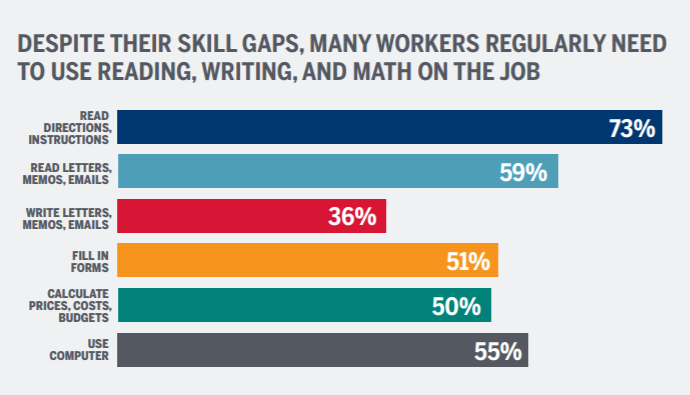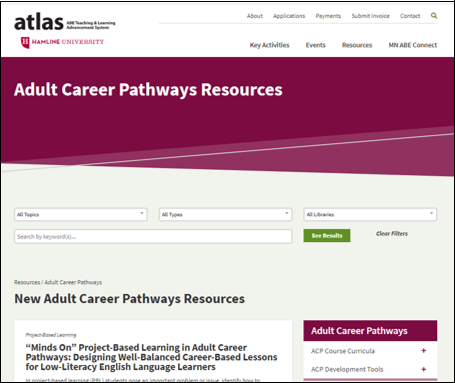- MN ABE Connect
- Archive
- Service Sector Workers – Skilling Up for Success
 January 27, 2020
January 27, 2020
Service Sector Workers – Skilling Up for Success
Liz Andress, Adult Career Pathways ConsultantMany of our ABE learners currently work in or plan to enter the service sector, where foundational math, literacy and technology skills are essential for surviving and advancing in their careers. The ATLAS online resource library has excellent resources to guide the “skilling up” learners need for work in health care, customer service, food service and the hotel industry. Check them out! Find lessons you can use in any ESL or GED class, get started on a focused occupational prep class, or start to build a full-fledged career pathway program.
Foundational Skills in the Service Sector: The Research
A 2017 study by the National Skills Coalition (NSC), Foundational Skills in the Service Sector, outlines the impact of limited math, reading and technology skills on workers and employers and proposes strategies to address the issue. As the report’s author Amanda Bergson-Shilcock states in an overview of the report, “These skill gaps serve as an invisible drag on productivity, often limiting workers’ ability to climb the career ladder and increasing employer costs” (2017).
This graph from the report illustrates the demands that service workers face on the job:

The report provides a detailed data profile of workers, examples of employer interventions that support skill-building, and recommendations for state and federal policymakers.
For ABE professionals, this report opens doors for critical discussions with employers in your service area about these skill gaps and the role that adult basic education can play as a partner in effectively “upskilling” workers to meet the demands of jobs and move up into supervisory and management roles over time. Read the five-page executive summary (at the beginning of the report) to see the key findings, and then delve into the 40-page report to learn more.
ABE Program Response
ABE is all about building foundational math, literacy, employability, and technology skills! Much of what we are already doing equips learners with the skills they need for success in the service sector. How can we expand our work to best address these needs?
1) Create delivery models that allow service sector worker participation.
 The NSC report found that “logistical barriers make it hard for workers to participate in learning opportunities. Nearly 1 in 3 workers (31%) said they would have liked to participate (or participate more) in learning opportunities over the past year but had not been able to. Lack of time and money were the overwhelming reasons given, including being too busy at work, the educational program being offered at an inconvenient time, having limited time for education due to childcare or family responsibilities, and being unable to afford the educational opportunity they wanted to pursue.” (Bergson-Shilcock, 2017). How can ABE programs, in partnership with employers and other training entities, remove obstacles and provide real access to learning? Creative approaches may include:
The NSC report found that “logistical barriers make it hard for workers to participate in learning opportunities. Nearly 1 in 3 workers (31%) said they would have liked to participate (or participate more) in learning opportunities over the past year but had not been able to. Lack of time and money were the overwhelming reasons given, including being too busy at work, the educational program being offered at an inconvenient time, having limited time for education due to childcare or family responsibilities, and being unable to afford the educational opportunity they wanted to pursue.” (Bergson-Shilcock, 2017). How can ABE programs, in partnership with employers and other training entities, remove obstacles and provide real access to learning? Creative approaches may include:
-
- Provide classes on-site at a company that workers can take before, during or after their work day.
- Provide free childcare at the class site and schedule classes at times that service workers can come.
- Deliver a “hybrid” class that minimizes in-class time and provides lots of independent, supported on-line learning that can be done anytime, anywhere, preferably on a smart phone.
- Think outside the box. Creatively brainstorm with employers, workforce partners and training/education providers to ask how you can provide the skill development crucial to workers’ current and future success.
2) Design courses that meet service worker needs.
-
- Use “career contextualized” content drawn from service sector jobs. Ask employers for authentic examples of directions, instructions, memos, forms and financial documents. If you have learners working in the service sector, ask them to bring in real examples to share with the class. Make it matter – and watch learners’ skills soar!
- Create learning activities that integrate reading, math, transitions and technology skill-building through active engagement, critical problem-solving, project-based learning, independent and group projects, etc. Drawing examples from the service sector works well for any group of learners, as we all interact with those service sectors all the time, even if not employed in that field.
- These learning activities and content can be provided in a regular ESL, ABE, or GED preparation class; in an occupational preparation class (like an 8-week customer service course, a food safety manager exam prep class, etc.); or in a multi-step career pathway program designed and delivered through complex partnerships.
Resources at Your Fingertips
 The ATLAS Adult Career Pathways (ACP) online resource library provides great tools to guide these efforts. They include:
The ATLAS Adult Career Pathways (ACP) online resource library provides great tools to guide these efforts. They include:
- Employer engagement issue briefs, toolkit, online course, webinar recordings, and more, to help you get started or expand your collaboration with employers who need ABE expertise in upskilling workers.
- Course design guidelines and template, created by ATLAS for use in MN ABE, to support a systematic approach to designing occupational preparation / career pathway courses.
- CareerKits with excellent standards-aligned lessons using contextualized content for the service sector, including healthcare, community and social services, hospitality/recreation, food production and retail.
- Ready-to-use course curricula, many written and taught by Minnesota ABE instructors, including 3 customer service courses, 3 food safety courses, and a hotel supervisory course. If your ABE program has a service sector course, please contact Liz Andress at ATLAS so it can be added to the resource library.
- Many more tools for developing a career pathway program.
ABE has a crucial role to play to ensure that service sector workers have the skills they need to succeed on the job and move beyond low-wage entry-level positions to supervisory and managerial roles with livable wages. This is exciting work, and ATLAS is happy to equip you for the road ahead!
References:
Burgson-Shilcock, A. (2017) NSC’s new report explores role of skill-building for service-sector workers. Retrieved from https://www.nationalskillscoalition.org/news/blog/nscs-new-report-explores-role-of-skill-building-for-service-sector-workers
Newsletter Signup
Get MN ABE Connect—the official source for ABE events, activities, and resources!
Sign UpArticle Categories
- ABE Foundations/Staff Onboarding
- ACES/Transitions
- Adult Career Pathways
- Assessment
- CCR Standards
- Citizenship
- COVID-19
- Cultural Competency
- Digital Literacy/Northstar
- Disabilities
- Distance Learning/Education
- ELA
- Equity/Inclusion
- ESL
- HSE/Adult Diploma
- Listening
- Math/Numeracy
- Mental Health
- Minnesota ABE
- One-Room Schoolhouse/Multilevel
- Professional Development
- Program Management
- Reading
- Remote Instruction
- Science
- Social Studies
- Speaking/Conversation
- Support Services
- Teaching Strategies
- Technology
- Uncategorized
- Volunteers/Tutors
- Writing